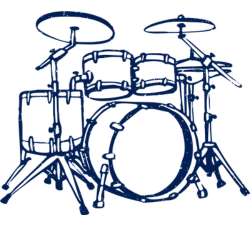
1. Learn the Basics of Playing the Drum
Playing the drum is a great way to express yourself musically. With some practice and dedication, you can master the basics of playing the drum. Here are some tips to get you started on your drumming journey:
Choose Your Drum Set
The first step to playing the drums is to find the right drum set for you. Consider your space, budget, and sound preferences when selecting a set. Make sure to try out the drums before you buy them to make sure they fit your needs.
Practice the Fundamentals
Once you have your drum set, it’s time to start learning the fundamentals. Start with basic beats and rhythms to get used to the feel of the drums. Practice using the different drum sticks and mallets to create different sounds. As you progress, you can learn more complex rhythms and patterns.
Learn Drum Notation
Drum notation is a great way to learn new drum patterns and understand complex rhythms. It’s also useful for reading sheet music and understanding drum parts in songs. You can find many online resources to help you learn how to read drum notation.
Stay Motivated
Learning the drums can be difficult and frustrating at times. It’s important to stay motivated and remind yourself of the progress you’ve made. Listen to music and watch drummers play to stay inspired. You can also attend drum classes or workshops to learn from experienced drummers.
2. The Best Drums for Beginners
When you are just starting out on the drums, it can be difficult to know what type of drum kit is best for you. There are a variety of drums available, and each has its own unique characteristics and features. To help you make the right choice, we’ve put together a list of the best drums for beginners:
1. Acoustic Drums
Acoustic drums are the classic choice for beginners. They are the most common type of drum and are available in a variety of sizes and styles. Acoustic drums are typically made of wood, and they provide a great sound that is perfect for any style of music. They are also relatively easy to learn, and they can be played in a variety of different settings.
2. Electronic Drums
If you’re looking for a more modern sound, then electronic drums may be the way to go. These drums are made of plastic and come with a variety of features, such as built-in effects and sounds. They are also relatively easy to learn and can be played in a variety of different settings.
3. Percussion Drums
Percussion drums are a great option for those who want to explore different sounds and rhythms. They come in a variety of sizes and styles, and they are perfect for creating unique rhythms and sounds. They are also relatively easy to learn and can be played in a variety of different settings.
4. Practice Drums
If you’re just starting out, then practice drums may be the best option for you. These drums are typically made of plastic and come with a variety of features, such as built-in effects and sounds. They are also relatively easy to learn and can be played in a variety of different settings.
No matter what type of drum you choose, it’s important to remember that practice makes perfect. With the right drum kit and the right attitude, you can become a great drummer in no time.
3. Top Tips for Improving Your Drumming Skills
1. Practice, Practice, Practice
The best way to improve your drumming skills is to practice regularly. Dedicate a certain amount of time each day to practice your drumming. This will help you develop muscle memory and get comfortable with playing different patterns. You should also practice playing with different tempos and rhythms to help you develop a better sense of timing.
2. Learn From Others
Learning from other drummers is a great way to improve your drumming skills. Watching videos of experienced drummers playing and reading articles about different techniques can help you understand the fundamentals of drumming and help you become a better player. You can also take lessons from an experienced drummer or take classes at a local music school.
3. Listen to Music
Listening to music is one of the best ways to improve your drumming skills. Pay attention to the drum parts and try to emulate the patterns and rhythms. This will help you get familiar with different drumming techniques and can help you come up with new ideas. You should also try to listen to different genres of music to get a better understanding of how different rhythms are used.
4. Play with Others
Playing with other musicians is an important part of improving your drumming skills. Playing with others helps you learn how to stay in time and play with the rest of the band. You can also get feedback from other musicians and learn from their mistakes. Playing with others is also a great way to have fun and stay motivated.
